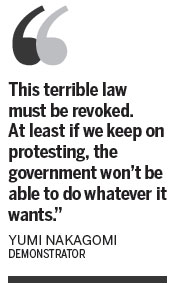Secrecy law takes effect in Japan
Hundreds of people rally to protest perceived threat to transparency
Japan's controversial Special Secrecy Law took effect on Wednesday, with 55 categories of information touching diplomacy, defense, anti-terrorism and counterespionage being defined as state secrets, amid strong public opposition.
Chiefs of 19 government ministries and agencies have the right to designate information as secret, and the initial five-year designation period for a state secret can be extended for up to 30 years under the new law.
But state secrets can remain classified for a maximum 60 years if approved by the Cabinet for security reasons, according to Kyodo News.
Leakers may face up to 10 years in prison, and those who instigate leaks, including journalists, will be subject to a prison terms of up to five years under the law.
Japanese Prime Minister Shinzo Abe said the law will promote exchanges of sensitive information between Japan and other countries and forge closer ties.
A recent Kyodo News survey covering the country's 19 government offices showed the number of state secrets likely will be around 460,000.
"The law says that the act of leaking itself is bad, no matter what the circumstances," said Yukiko Miki at Clearinghouse Japan, a nonprofit organization that promotes information disclosure.
Public concerns
To ease public concerns that argued the definition of such secrets is vague and noted the absence of an independent checking mechanism, the government also approved guidelines on the handling of state secrets.
The guidelines will keep "the minimum amount of information as secret for the shortest period of time possible" as the public's right to know should be "greatly respected" in a democratic society, Kyodo cited the government as saying.
Two watchdog groups are to oversee implementation of the law, one directed by the prime minister.
On Wednesday, hundreds of demonstrators gathered in front of the prime minister's office, waving banners and banging tambourines, saying their right to know is under threat. Hundreds of students also rallied on Tuesday night protesting the law.
"This terrible law must be revoked. At least if we keep on protesting, the government won't be able to do whatever it wants," said Yumi Nakagomi, 59, one of several hundred people braving frigid winds.
Hiyama, one of about 800 people at a protest on Tuesday night, said, "This law restricts the public's right to know."
The Japanese Newspaper Publishers and Editors Association submitted a memorandum on Monday to Japanese Justice Minister Yoko Kamikawa, demanding the rational use of secrecy law.
The press lobby said that the sentence applied to people "who leak state secrets" is too heavy, which may cause public servants to fall into silence. Legitimate reporting activities of news organizations would also be damaged, the group said.
Xinhua - Reuters

(China Daily 12/11/2014 page11)








